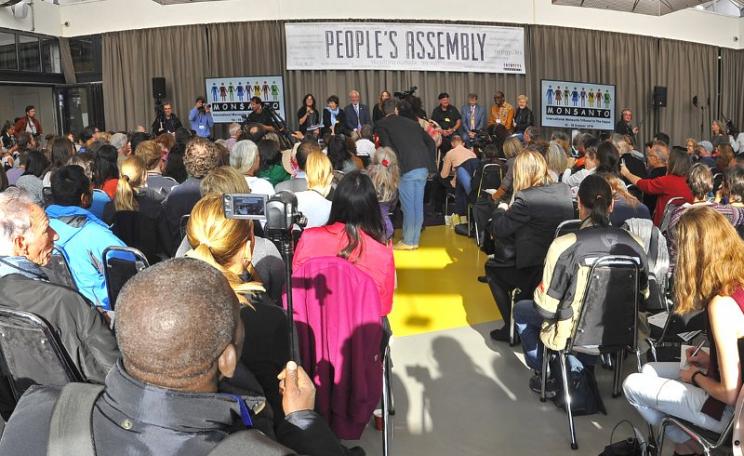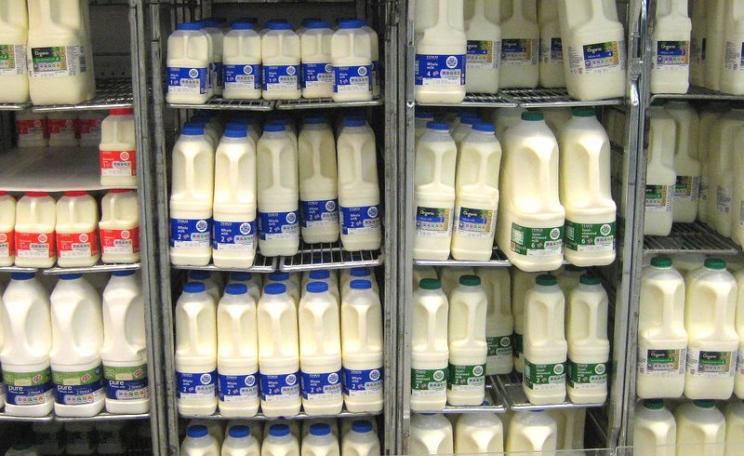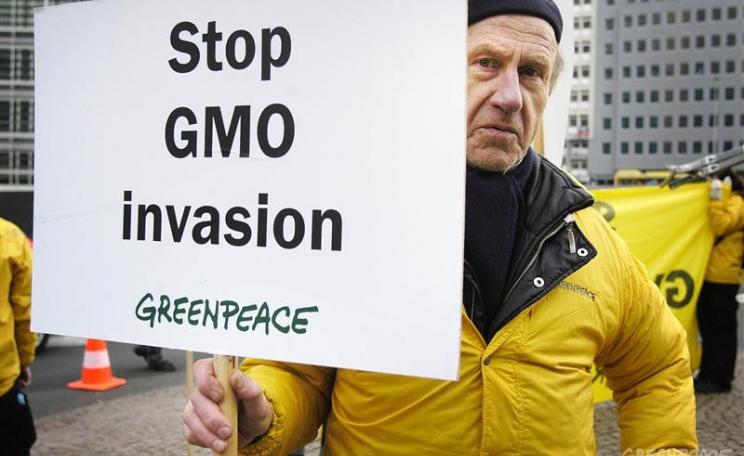Although an army of vested interests, rent-a-quote 'scientists' and' bought' politicians remains as vocal as ever about the promises of GMOs, the reality, two decades on, is that they have consistently failed to deliver.
"It was 20 years ago today ... " as the song goes - and in many ways the sparkly side-show that is genetically modified food is as lacking in substance as the eternal showmen of Sgt Pepper's band.
On this day in 1996 the first GM product - a tomato puree made from the Flavr Savr tomato hit UK shops.
The product was produced by Zeneca from tomatoes that were grown and processed in California and genetically engineered to ripen more slowly. It was introduced to the UK by supermarkets Sainsbury's and Safeway. The paste was competitively priced and clearly labelled and more than 1.8 million cans were sold from 1996 through early 1999.
For a while the GMO tomato paste even out-sold conventional tomato paste at many locations, but sales declined dramatically in 1998 as consumers became more aware of just what was at stake. It was withdrawn from the market in 1999.
The Flavr Savr tomato isn't just a footnote in GMO history. It was a turning point, which showed that even when a product was sold at a cut rate price, consumers were simply not prepared to gamble with the unknown consequences of eating GM foods.
Although an army of vested interests, rent-a-quote 'scientists' and' bought' politicians remains as vocal as ever about the promises of genetically modified crops, the reality, two decades on, is that GMOs have consistently failed to deliver.
A damaging, outdated approach to farming
What this anniversary highlights is that genetic engineering of food crops is an outdated approach to food production. It has its roots in a world that still believed in the Green Revolution and the idea that industrialised monoculture chemical-heavy farming was the way to feed the world.
No matter how much money has been thrown at GMOs from government, private investors and corporations, no matter how much PR spin is put on the story, the fact remains that the promises that genetically modified food would revolutionise our world, feed the hungry, boost the yields and therefore the incomes of farmers, cure disease and more recently fight climate change remain spectacularly unfulfilled.
In fact, the original intent of GMOs wasn't to do any of these things. It was, arguably, more focused on creating a more easily controlled international market of standardised food products. Indeed the issue of climate change had not yet come to the fore when the first GMO crops were being introduced.
This factory farming paradigm, which is rooted in the notion that yield is the most important measurement of success and that perceived agricultural problems arise as a result of some genetic flaw in nature, is a worn out concept and GM technology is increasingly looking like a relic of a bygone age.
Although an army of vested interests, rent-a-quote 'scientists' and' bought' politicians remains as vocal as ever about the promises of GMOs, the reality, two decades on, is that they have consistently failed to deliver.
Continuing to promote it as solution to current and future problems is rather like trying to walk forward whilst looking backwards.
20 years of failure documented
For our launch late in 2014 Beyond GM produced The Letter from America - a plea from US citizens to citizens of the UK and EU not to embrace GMOs the way the Americas have.
The fully referenced letter detailed 20 years of failure and we urge everyone who wants a quick primer in GMOs to read it (it is now available in eight languages) and we urge US citizens to continue to sign it and UK citizens to send a copy to their MPs from the site.
The Letter showed that in that time GMO crops have, in fact, increased pesticide use. The US Government's own data shows that herbicide use has increased dramatically over the last decade and that total volumes of glyphosate applied to the three biggest GM crops in the US - maize, cotton and soybean - have increased tenfold.
They have also failed to consistently increase yields. They haven't reduced costs to farmers nor increased profits. They haven't created an international market - most of the world rejected GMO crops and a recent UN report even suggested that GMOs were responsible for a rise in trade disputes (when shipments of grain are found to be contaminated with GMOs).
Embracing the GMO agenda has had direct consequences, in that it both supports and accelerates an outmoded factory farm mentality, and indirect consequences, in terms of environment, health and culture but also science and democracy.
GM Nation?
In 2002/2003, long after the Flavr Savr had been forgotten, the Labour party conducted the only really comprehensive investigation into GMOs in the UK, GM Nation.
That suite of investigations included public debates and research into consumer attitudes, it included an economic analysis (which included looking at liability for economic and environmental damage) and an environmental analysis.
The economic review concluded there was no benefit to UK plc from growing GM crops; the environmental review found severe damage to the countryside and biodiversity; and the public debate showed was widespread mistrust of government and multinational companies, with participants expressing a very strong interest to be 'better informed' about GM issues.
In fact, only 2% of the more than 30,000 people who took part in the consultation said they would be happy with GM foods in any circumstances. A staggering 93% thought that GM technology was "driven by profit rather than the public good."
Since that time no government, no regulator and very few scientists, has asked the really important question about GM crops and foods:
- Not just who benefits from the technology, but who loses?
- What new facts have emerged about the environmental and health consequences?
- What productive and sustainable alternatives have fallen by the wayside in the push for GMOs?
- How does the technology affect what we are producing and how we are producing it - and to whose needs does it respond?
- What are the social goals and ethical criteria that guides research?
- What are the social and agronomic goals?
A world in need of repair
Some people may not like it, but we know most of the answers about whether GMOs are worth it already.
As the current Conservative government pushes ahead with its irrational, anti-science, pro-GM agenda we would argue that any party that wishes to be influential in the future, needs to have a rational sustainable food policy which acknowledges that, from an agricultural point of view, we are living in a damaged world in need of deep repair.
It is a world that is facing challenges that could not have been anticipated 20 years ago when GM technology first entered the marketplace and many these challenges are the result of our own short-termism and greed.
In order to begin the process of repair several things urgently need to be done. We believe that these things are best addressed in the space of a continuing moratorium on the planting of GM crops in the UK.
Changing the framework
Most urgently, the regulatory framework by which GMO crops and the chemicals used on them and GM foods are assessed its completely inadequate:
- There is a lack of transparency with regard to the decisions taken around GMOs
- There is no requirement for independent testing
- There is a lack of post marketing surveillance
There are new challenges too in that biotechnology companies are lobbying to have newer forms of plant breeding technologies, which clearly fall under the heading of GMOs, regulated as non-GM.
The problem of co-existence and environmental contamination and degradation have never been adequately addressed. There is still a complete lack of laws covering environmental and economic liability. These have to be addressed with more than just bland reassurances before crops are planted.
There is a better way
In spite of its promises of drought tolerant and salt tolerant crops - neither of which has materialised - or food crops that will contain extra nutrients - again none exist commercially - it has dismally failed to anticipate and to paint a compelling picture of what our farming and food future should be.
Other people, scientists and farmers, have painted that picture though. The 2008 IAASTD Report which was sponsored by a number of major international organisations, including the United Nations, the World Bank, the UN Food and Agricultural Organization, and UNESCO concluded that industrial farming was too dependent on cheap oil and too damaging to the wider environment and was not a suitable technology for alleviating hunger because it does not benefit small and subsistence farmers, and it is these farmers that provide 70% of the world's food.
The 2010 UN report into Agroecology and the Right to Food concluded that organic and sustainable small scale farming could double food production in the parts of the world where hunger is the biggest issue.
Rebuilding public trust in food and farming
In the space of the de facto moratorium on GMOs which has been in effect over the last two decades the government could usefully and effectively have directed funds into studies and projects around agroecological methods of farming.
It could have engaged the public at the level that it did in 2003 on the issue of GMOs - because the public are important stakeholders in this issue. A continuing moratorium would allow space to get it right the second-time around.
Public trust in our food system is at an all-time low. None of us should have to live in a world where words like 'poison', 'scare', 'insecurity', 'crisis' and 'waste' are consistently being paired with the word 'food'. And yet that is the world that is being created by a bull-headed adherence to the myth that GMOs and techno-farming will save the world.
Public concerns on every level, not just about the science but about the ethics, and the 'rightness' of GMOs are legitimate and deeply felt, rooted in rational science, and should be taken seriously.
Why not make this anniversary of the GMO Flavr Savr tomato a turning point where we can begin to get beyond the GM paradigm and onto a more positive and productive way of thinking about food?
Pat Thomas is a director of the campaigning group Beyond GM, founder of GM-free Me, and a former editor of The Ecologist. This article first appeared on the Beyond GM website.






